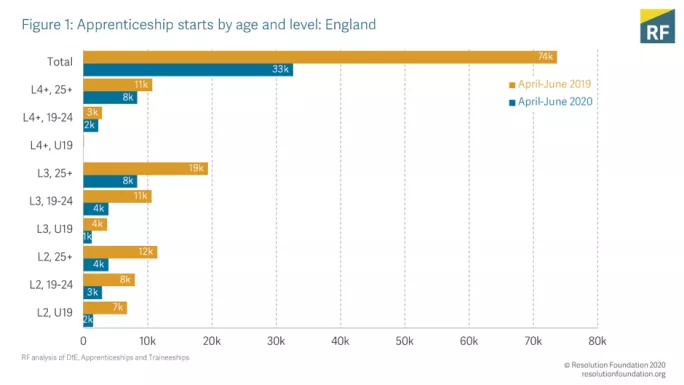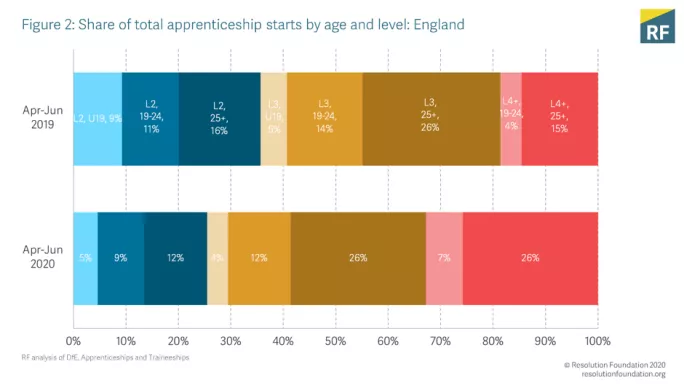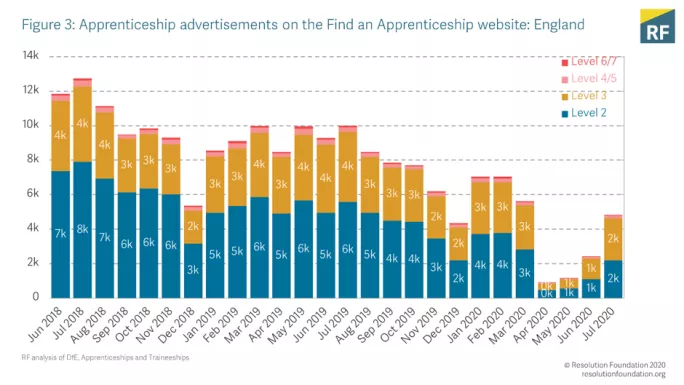
- Home
- Apprenticeships starts: will they ever bounce back?
Apprenticeships starts: will they ever bounce back?

Despite promises to build a "world-class" technical education system in England, it wasn’t lost on many young people (and indeed, many Tes readers) that the government has appeared more focused on outcomes for A-level students than for those who’ve pursued technical or vocational qualifications such as BTECs (some of whom are still awaiting their results).
This morning’s figures on apprenticeship starts, published by the Department for Education, will do little to build confidence in the idea that young people who aren’t heading for university will be able to use the apprenticeship system to develop their skills and experience.
BTEC results: Final grades to be issued by 28 August
More: Teaching apprenticeship system 'fractured'
Coronavirus: What next for apprenticeships?
So, what do the figures show? First, the number of apprenticeships started during April-June (when the country had been under some of its most restrictive lockdown measures) were 56 per cent lower than during the same period in 2019 (see figure 1). As ever, there are some significant differences that sit beneath this headline figure, with starts for younger apprentices being worst affected.

For instance, there over 5,000 fewer apprenticeship starts (a fall of 78 per cent) among 16-to 18-year-olds at level 2 and nearly 2,500 fewer starts among 16-18-year-olds at level 3 (a 65 per cent decline) than in 2019. And although there was a notable fall in starts for older apprentices and at higher-levels of study, this was less marked. For instance, the number of higher-education level starts for those age 25 and older fell by 21 per cent.
In other words, the economic effects of the coronavirus appear to have accelerated a pre-existing trend: a continued fall in apprenticeship opportunities for young people running against a rise in opportunities for older apprentices at higher levels of study – many of whom appear to be pre-existing staff. In fact, figure 2 illustrates the extent to which the system has, over recent months, tilted even further towards higher-level programmes: well over half of all starts went to apprentices age 25 and older, including more than one quarter (26 per cent) going to people over the age of 25 beginning higher-education level programmes.

This shouldn’t be too surprising: younger apprentices and those at lower-levels of study are more likely to work in sectors that were temporarily shut down, like retail and hospitality. Higher-level programmes, which are more commonly taken up by those age 25 and older, are more prevalent in white collar sectors, which were less affected by lockdown measures as staff are typically more able to work from home.
Of course, the big question we’re all asking is whether the economy, and apprenticeships in particular, will see any sort of bounce back in the foreseeable future. There should be some room for guarded optimism. For instance, although the number of advertisements posted on the government’s "Find an Apprenticeship" website in July 2020 was less than half the number posted in July 2019, it was still substantially higher than in April to June 2020 (see figure 3).

But despite cautious optimism, it’s clear some apprenticeship opportunities were affected more than others. Although the total number of July 2020 adverts was 52 per cent lower than in July 2019, the number of adverts for programmes at level 2 fell by 62 per cent while the numbers at level 3 and levels 4+ fell by 40 and 44 per cent, respectively. In other words, even if apprenticeships experience a continued recovery, young people (who are more likely to take on lower-level programmes) will not be the first to experience it.
A worrying development
Stepping back, this is worrying development. Research from the Resolution Foundation has already shown that this crisis is likely to leave young people, and especially young non-graduates, with long-lasting economic scars. And while the government have attempted to bolster employer interest in apprenticeships by way of an "apprenticeships bonus", our analysis suggests that the bonus as a proportion of typical apprentices’ wages is too small to have much of an effect on firms’ hiring decisions.
Other schemes designed to help young people find work and build their skills, like the government’s kickstart jobs programme, are welcome – but there are questions about how many young people will be able to benefit, and details are still very thin on the ground.
This morning’s figures are just one more piece of evidence telling us how difficult things are for young people outside the typical A level to university track at the moment – and this requires far more than kind words and speeches.
Kathleen Henehan is research and policy analyst at the Resolution Foundation
Register with Tes and you can read five free articles every month, plus you'll have access to our range of award-winning newsletters.
Keep reading for just £4.90 per month
You've reached your limit of free articles this month. Subscribe for £4.90 per month for three months and get:
- Unlimited access to all Tes magazine content
- Exclusive subscriber-only stories
- Award-winning email newsletters
You've reached your limit of free articles this month. Subscribe for £4.90 per month for three months and get:
- Unlimited access to all Tes magazine content
- Exclusive subscriber-only stories
- Award-winning email newsletters



